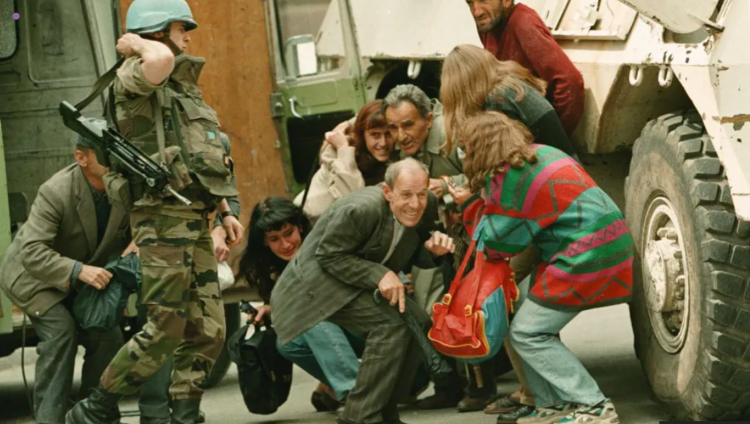
Picture Credits: Netflix
There’s nothing dry about Death By Lightning. The title alone suggests a period piece that packs a punch. The show’s creator, Mike Makowsky (Bad Influence), not only delivers those punches but also a ton of laughs and oddities.
Case in point: Charles Guiteau’s (Matthew Macfayden) brain.
James Garfield’s (Michael Shannon) assassin’s brain serves as the framing device for the Netflix limited series. The discovery of the brain — in-a-jar, mind you, takes viewers from the 1960s back to the 1800s, when Garfield becomes president against his own desires. The candidate attracts the unwanted attention of Guiteau, an unwell man who takes the president’s life.
The show’s warm reception, as well as the debates it has sparked, is more than rewarding for its creator, who wrote every episode. “It’s a little weird for it to be finally out in the world after about seven years of working on it,” Makowsky told What’s On Netflix. “I’m crawling out of this James Garfield rabbit hole, and it’s exciting to see people engage with this pocket of history. To see Netflix viewers debating the merits of James Garfield and Chester Arthur, it’s a dream come true for a history nerd.”


Garfield’s speech, which lands him the Republican nomination for President, is fantastic. How’d you want to represent him as a public speaker?
I believe he gives two speeches in the show, and obviously, he has other moments where he’s outlining his vision for and his ambition as president. Specifically the convention speech, it’s probably about 70–30 actual verbiage. I modernized some of the language, and there’s a little bit of condensation that happens. The speech was longer, but I endeavored to put a version of it out there that honed as closely as possible to the intention of the speech.


Death by Lightning. (L to R) Michael Shannon as James Garfield, Vondie Curtis-Hall as Frederick Douglass in episode 102 of Death by Lightning. Cr. Larry Horricks/Netflix © 2025
As a self-described history nerd, what drew you to Garfield not only as a history fan but a screenwriter?
It was the promise of a potentially generational leader that, as a nation, we were tragically robbed of. It all starts at the convention for me, which is one of the first parts of Candice Millard‘s book, “Destiny of the Republic.” When I first read her book I was like, “What is it about this man who has no overt designs on being president? What is it about him that when he goes up to give this speech on behalf of an entirely different candidate? What about that speech and his presence and his words compels people to stand up in the rafters and shout, ‘We want Garfield!’?”
In a lot of ways, it was his nobility. Also, it was just fierce intelligence, his progressive, outspoken advocacy for Black suffrage and universal public education and civil service reform. He was also a poster boy for the American dream. He grew up in abject poverty and rose up the ranks entirely on his own merits.
What drew me to him not only distinguished him from a lot of his fellow politicians in 1881, but distinguished him a lot from politicians of our era. Where are the James Garfields now?
He’s also depicted struggling with PTSD from the Civil War. It’s handled respectfully in the show, so what conversations did you have with Michael about how much his past drives him?
And that’s part of the reason you cast an actor like Michael Shannon who brims with so much complexity. There’s nothing simple about Michael Shannon. There was, I think, a less compelling version of Garfield where he comes across as just a pure lawful good without any of the thorniness of his trauma — a trauma that governed a lot of men’s psyches in that era.
This was a generation of men, many of whom had fought in the Civil War and survived untold tragedy at the hands of their fellow Americans who then they had to reunite with at the end of the war. So, in the wake of the Civil War and Reconstruction, America was in a very precarious place and a very precarious crossroads. To see a lot of that trauma play out… Garfield was plagued by nightmares of the war for the rest of his life. He was never quite able to regain that mental balance.


Death by Lightning. Michael Shannon as James Garfield in episode 101 of Death by Lightning. Cr. Larry Horricks/Netflix © 2025
What was your first reaction to seeing Michael Shannon perform the convention speech?
I have to tell you, even before take one, the convention was enormously complicated from a production perspective, so we did two days of blocking rehearsals just for all of the scenes with all of the actors. Michael Shannon’s first day on set subsequent to that was him showing up at the convention. So, we didn’t know what we were going to get that day. Matt Ross, our amazing director, was very clear to all of the actors assembled that day: you can read the lines off of the sides or whatever. This is just a blocking rehearsal. Don’t worry. No one’s expecting any sort of performance.
Michael Shannon has a three-page speech. We all sort of expect him to read it off the sides, and then he goes up to the podium and recites it word-perfect from memory as James Garfield. It just sends chills up, I think, all our spines. That’s the president. We all just felt that day and then every day after that, as he had to recite that speech in terms of getting coverage many, many times. Every single time it was electric.
Garfield was a preacher in addition to all of his other professions, and you feel that fire in Shannon’s voice.
We’re jumping far ahead to the final episode now, but there’s another key speech delivered in the show by Lucretia Garfield (Betty Gilpin), telling Guiteau no one will remember him for assassinating her husband. How satisfying was writing that speech?
It ends up being an elegy for Garfield, the sort of honest elegy for Garfield’s legacy and for the series at large, but also the final condemnation for Guiteau — the final rejection, let’s say. I think what scared Guiteau more than his impending death was the idea that he would not be remembered well, that he would be the villain of the story rather than the hero to future generations.
Number one, Betty Gilpin is just such an exceptional actor, so you want to be able to give her a scene like that. She nailed it much in the way that Michael Shannon nailed Garfield’s speech. She came prepared, bringing just a well of emotion, but also strength to that moment of conviction. You’re with her in that scene, but also in reality, to be able to give Lucretia Garfield that level of agency and power, it was an indelible proposition.
How about audiences’ surprising introduction to Charles Guiteau? There’s something about a forgotten brain that’s both hilarious and tragic.
As soon as I read Candice’s book, I knew that that had to be how the show started. For both production reasons and just in the notes process, people asked me to remove the scene. I wouldn’t move off of it. In my mind, it makes a statement early that this isn’t your great-grandfather’s period piece.
Opening the show in 1969 with the Sly and the Family Stone song, and a bunch of construction workers finding a brain in a jar — absent any context — and they hear this name Charles Guiteau… In 1969, even none of these guys had ever heard of him much in the way that I think most people in 2025 will have never heard him before. It felt like an interesting thesis statement for the rest of the series and wholly different from what we might be expecting from a period show.


Death by Lightning. Matthew Macfadyen as Charles Guiteau in episode 102 of Death by Lightning. Cr. Larry Horricks/Netflix © 2025
Did you and Matthew Macfadyen approach Charles Guiteau as someone who truly believes in himself? Does he buy his own lies?
I think it’s open to interpretation. Matthew is the type of actor who wears his heart on his sleeve. He is extremely compelling at playing characters who we care for in spite of themselves.
Guiteau very much has the strength of his convictions. I think if he is telling little white lies, like he does to his sister when he suggests that he has received a loan for his new newspaper concept, I think he feels they’re in service of a noble purpose.
What studies have they done on Guiteau’s brain over the years?
It has been studied by me, because I got to spend some time with the brain.
What was that like?
Weird. I had to get special government permission. It existed in a part of an army base in Maryland. Actually, you can’t fit a full brain into one mason jar. There are other parts of his brain that are in other parts of the world. The piece that I could get access to was at an army base in Maryland, but it took months of very strange emails with government officials in order to be able to get an appointment to see the brain. But I did. It was very strange; there are pictures of the brain online.
Because it was the first scene of the show, I was very curious to see it up close. We wanted to recreate it as faithfully as we could, although our brain made by our wonderful props department maybe looks a little bit more like a brain. The actual brain kind of looked to me like gefilte fish in a jar.
Please, take our readers through – step by step – meeting Charles Guiteau’s brain.
It’s just so strange. It’s a regular old mason jar that just has the brain of a presidential assassin in it. But I go to this army base and I’m making small talk with this archivist as she’s supervising me as I’m looking over the brain, and she doesn’t seem to know much about the Garfield assassination or about Guiteau. I’m kind of trying to fill the silence as I’m looking at the brain, talking out loud and I’m like, “It’s remarkable that this is really the only thing left of Guiteau. His remains were, to the best of my knowledge, buried in an unmarked ditch somewhere.” And she said, “No, they weren’t.” I look up at her and I’m like, “What do you mean?” And she’s like, “Yeah, no, Guiteau wasn’t buried.”
And I was like, “How do you know that?” And she’s like, “Because we have ’em here in the next room.” I stared at her for a moment. I’m like, “Can I see?” And she’s like, “Yeah, okay.” And so, she takes me into the next room to this big Indiana Jones-style room, rows and rows of filing cabinets. She just pulls out a regular old filing cabinet, and there are all of Guiteau’s bones laid out in this filing cabinet.
Perversely, and the strangest part, is that just underneath, I can see this misshapen skull. It’s not Guiteau’s skull, so I’m like, “Well, who’s underneath him?” And she’s like, “Oh, well, that’s fun. It’s the remains of Ham, the space chimp.” The space chimp and Charles Guiteau are neighbors, which feels oddly fitting.
There’s your sequel. There’s your season two.
It could have been the last scene of the show. It could have just been him being thrown into this obscured filing cabinet next to a monkey.


Death by Lightning. Nick Offerman as Chester A. Arthur in episode 104 of Death by Lightning. Cr. Larry Horricks/Netflix © 2025















